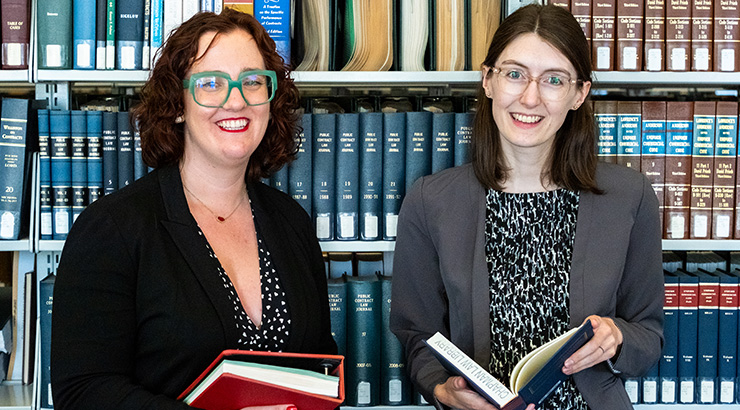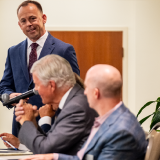
2022 Golden Gavel Winners Summer Externship In the United States Court of Appeals for the Ninth Circuit.
August 24, 2023
By Jodee Storm Sullivan, Kaelyn Timmins-Reed and Deane Sutic.
Law school externships are an opportunity to forge links between the theory and practical application of the law, a chance for students to hone their legal acumen while embedding themselves in supervised praxis, usually within an established practice or agency. From time to time, a student will have the good fortune to extern with a highly respected legal mind like the Honorable John B. Owens on the United States Court of Appeals for the Ninth Circuit. This summer saw Chapman Law enjoying the distinction of having two students extern for Judge Owens: Jodee Storm Sullivan, and Kaelyn Timmins-Reed, Fowler School of Law’s 2022 Rutan & Tucker Golden Gavel Winners.
Judge Owens is a familiar face at Chapman Law, making appearances at a number of events in 2022 whilst also featuring as an exhibition round judge at the school’s annual Golden Gavel competition. Requiring scant introduction, Judge Owens is a highly regarded Berkely (’93) and Stanford (JD ’96) graduate who clerked for both the Honorable J. Clifford Wallace on the U.S. Court of Appeals for the Ninth Circuit and for none other than the late Associate Justice Ruth Bader Ginsburg on the United States Supreme Court. You might say that being selected by Judge Owens for this externship opportunity came as a most welcome and humbling surprise to both of our Golden Gavel finalists. As coveted and prestigious as such a summer externship may be, Judge Owens made Sullivan and Timmins-Reed feel like welcome guests, personally leading their guided tour of the Edward J. Schwartz courthouse, where he impressed both students with his warmth and familiarity with courthouse personnel and colleagues from his days at the nearby Assistant U.S. Attorney’s office.
Joining the team of Judge Owens’ clerks, Timmins-Reed and Sullivan found their feet researching, writing, and presenting memoranda to the team while also observing the district and magistrate court proceedings in their free time. When Judge Owens served on a Ninth Circuit panel in Pasadena this summer, he included both Chapman students on the trip, and the debriefing of cases with his clerks, emphasizing the importance of good lawyering and oral advocacy. For Sullivan, this “behind the curtain” experience meant exposure to different advocacy styles and the range of briefs submitted to the Ninth Circuit. However, a detailed reading of each brief’s arguments, formatting and structure brought invaluable direction and pointers of technique to Sullivan’s own education. For Timmins-Reed, part of her professional growth over the summer came from the challenge of establishing her own bird’s-eye-view perspective of a case as opposed to picking and defending only one side of the argument. As she puts it, “On appeal, things are very different from trial.” Timmins-Reed adds, “if there are things the attorney forgot to mention in the brief, the argument may be forfeited.” She adds that appeal cases require a rigorous application of the law and the correct standard of review along with a focus on addressing judges’ questions. That perspective now informs her approach to moot court tête-à-têtes at law school.
With a great many of the cases passing through the Ninth Circuit being focused on immigration issues, the pair were fortunate for the opportunity to visit and tour the U.S.-Mexico border with Judge Owens’ staff. This field visit gave the students a greater understanding of the current state of Customs and Border Patrol procedures immigrants encounter. Additionally, Sullivan and Timmins-Reed were immersed in the court’s established program for clerks and summer externs. The students were treated to detailed weekly panels and presentations from magistrates, district court, and Ninth Circuit judges as well as local attorneys–a veritable wealth of knowledge and networking opportunities. However, this summer externship was by no means a cakewalk; tough lessons were also on offer, “Immigration law is challenging,” Sullivan adds, likening it to a labyrinth that hosts its fair share of pitfalls for the unwary. Still, the takeaways from the experience endure in the elevation of her understanding of legal writing, which has been introduced to a new standard through this experience.
Sullivan and Timmins-Reed also had the opportunity to “screen” cases before a panel of Judge Owens and two other Ninth Circuit judges. This involved drafting proposed memoranda of disposition and orally presenting straightforward cases to the panel for their approval. In the process of researching, drafting, and orally practicing these cases before Judge Owens’ staff, Sullivan and Timmins-Reed learned to spot key facts and issues in the cases. “It was a different experience from moot court because we had to present with an objective tone instead of arguing on behalf of a client,” Timmins-Reed said.
What advice do these two intrepid students have to pass on to others seeking to grow into their legal education through similar externship experiences? Jodee Storm Sullivan is clear on this, “I had to learn a whole new ecosystem,” she notes, encouraging others to allow themselves the experience of immersion in a novel experience of the law, however anxiety provoking that may be for a novice law student. Kaelyn Timmins-Reed offers equally practical advice, “Join a journal,” she says, indicating that the regular practice of researching and Bluebooking are invaluable skills to bring to the externship experience and of great benefit when you find yourself trying to digest even a small portion of the caseload of the U.S. Court of Appeals for the Ninth Circuit.
